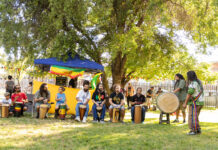Without a doubt, music and anything else that is made with the heart is capable of transcending borders, to go far, to open roads that seemed impassable and to sow those values that today seem to have been lost. Bob Marley, the prodigal son of jamaica, who was the man who through Reggae carried the Rastafari message to all corners of the planet, possessor of great charismatic strength left a musical legacy and an enduring image. It is 2020 are met 75 years of his birth, and also, 40 years of his last live presentation precisely in the month of September.
A life story that began in poverty and ended in global stardom, surviving that hostile atmosphere that Jamaica lived in at the end of the decade of the 70, when political disputes dominated the ghettos de Kingston.
It was the year 1980, when Bob Marley was on a world tour promoting his album number 12, el “Uprising”. The tour had started at the Hallenstadion in Zurich, Switzerland, the 30 May of that year, on a tour of Europe that led him to perform in countries like Ireland, Italy, Scotland, Germany, UK, Denmark, among others. Later, his goal was to tour the United States.
Bob Marley's health condition was not optimal, He had been battling a malignant melanoma on the thumb of his right foot for three years and, because of his Rastafarian life faith, refused any kind of surgical intervention, reason why an irreversible disease was triggered that eventually branched out throughout his body.
The 23 September 1980, what would be his last concert was witnessed at the Stanley Theater in Pittsburgh, a historic night that we remember today 40 years later. Two days before this concert, Marley had passed out jogging in New York's Central Park. He came from giving two full shows at Madison Square Garden, even though his health was already very deteriorated.
When he collapsed, he was taken to the hospital where the doctors advised him to cancel his tour and return home to rest.. But nevertheless, decided to continue until his body allowed, gambling against the brain tumor that had already developed. Confident by the adrenaline that kept him active with music, in the same way he went to Pittsburgh, Pennsylvania, to offer this concert that without knowing would be the last show of his life.
As if he sensed that the end was near and that said show was going to represent his farewell with the public, The Reggae idol performed at the Stanley Theater in a big way and made the audience vibrate to the rhythm of “No Woman, No Cry”, “Is This Love”, “Get Up, Stand Up”, “Redemption Song”, “Jamming”, “Zimbabwe”, “Could You Be Loved”, among so many other hits that were immortalized on the live album “Live Forever”.
After that historic night, Bob Marley decided to prioritize his health, suspending the rest of the tour to travel to Germany, where he stayed eight months at the Josef Issels clinic, who proposed an alternative treatment for cancer, avoiding certain types of foods and drinks, but that nevertheless did not have the expected result in Marley.
Unfortunately his health was not improving as the cancer had spread to other areas of his body. Marley decides to return to Miami with his family. But when landing on American soil, his vital functions began to fail and he had to be hospitalized urgently. Finally the 11 May 1981, to the 36 years, Bob Marley passed away at Cedars of Lebanon Hospital and that concert in Pittsburgh became one of the most iconic of his career.
Songs of freedom, love, esperanza, Justice, spirituality and rebellion, against oppression, song of the voiceless, It is part of the great heritage that Bob Marley left us, unforgettable lyrics that we can't stop singing or listening to, songs that almost 40 years of his departure sound with the same force and whose messages are still valid in today's world.
Source: Portales / RC





















